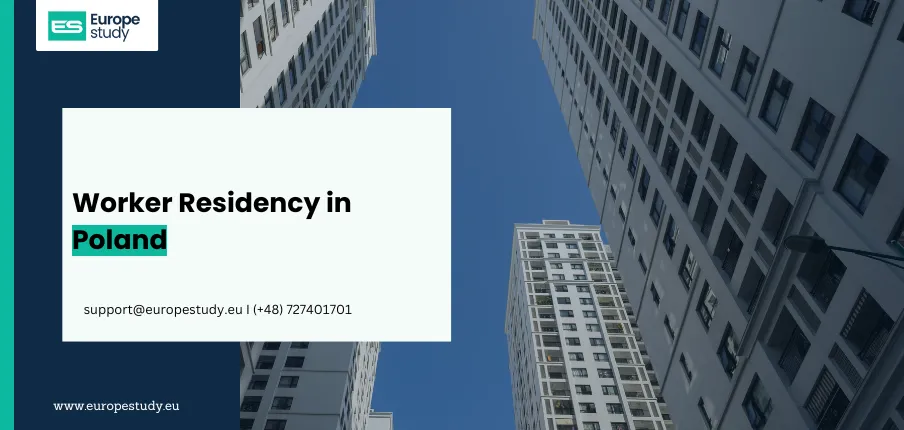
Worker Residency in Poland
Introduction
Poland has emerged as a key destination for foreign workers due to its robust economy, growing job market, and relatively straightforward immigration policies. Whether you're an EU citizen or from a non-EU country, understanding the worker residency process is crucial for a smooth transition to living and working in Poland. This guide provides a comprehensive overview of the requirements, application procedures, and essential information regarding worker residency in Poland.
Understanding Worker Residency in Poland
Poland offers different types of residency permits depending on the duration and nature of employment. These include temporary residence permits, permanent residence permits, and the EU Blue Card for highly skilled workers.
1. Temporary Residence Permit for Work Purposes
A temporary residence permit allows foreign nationals to reside in Poland for employment. This permit is generally granted for up to three years, depending on the contract length and other factors.
Eligibility Criteria:
- A valid job offer or work contract from a Polish employer.
- A valid work permit (if applicable, for non-EU citizens).
- Proof of sufficient financial means to sustain yourself.
- Health insurance coverage.
- A place of residence in Poland.
Application Process:
- Secure a job offer from a Polish employer.
- Apply for a work permit (if necessary, for non-EU nationals) through the employer.
- Submit an application for a temporary residence permit at the appropriate Voivodeship Office (Urząd Wojewódzki).
- Provide necessary documents such as passport, employment contract, proof of accommodation, and insurance.
- Attend a biometrics appointment.
- Await approval, which may take several months.
2. Permanent Residence Permit
A permanent residence permit allows foreigners to stay in Poland indefinitely. However, it is typically granted to those who have lived in Poland for an extended period under specific conditions.
Eligibility Criteria:
- Legal residence in Poland for at least five years on a temporary residence permit.
- Stable and regular income.
- Sufficient knowledge of the Polish language.
- A clean criminal record.
3. EU Blue Card
The EU Blue Card is a special residence permit for highly skilled workers from non-EU countries who wish to work in Poland. It provides a streamlined pathway to permanent residency and allows mobility within the EU.
Eligibility Criteria:
- A higher education degree or relevant professional experience.
- A work contract offering a salary of at least 150% of the average gross salary in Poland.
- A valid work permit.
4. Work Permit Categories
For non-EU nationals, a work permit is required before applying for a residency permit. The most common types include:
- Type A: For foreigners employed by a Polish company.
- Type B: For board members staying in Poland for more than six months in a year.
- Type C, D, and E: For foreigners assigned to work in Poland by a foreign employer.
How to Apply and How EuropeStudy Can Help
Applying for worker residency in Poland can be a complex process, but our company, EuropeStudy, is here to assist you every step of the way. We provide:
- Personalized Consultation – We evaluate your eligibility and guide you through the best visa and work permit options.
- Document Preparation – Our experts help you gather and verify all required documents, ensuring compliance with Polish immigration laws.
- Work Permit Assistance – We liaise with employers and government offices to expedite the work permit application process.
- Residency Permit Application Support – We help submit your residency permit application and track its progress.
- Legal and Compliance Advice – Our legal team ensures that your employment and residency status remain valid.
- Post-Arrival Support – From accommodation to settling into the Polish work environment, we provide continued assistance.
By choosing EuropeStudy, you can simplify the application process and increase your chances of securing residency in Poland without unnecessary delays or complications.
Rights and Responsibilities of Foreign Workers in Poland
Foreign workers in Poland enjoy several rights, including fair wages, safe working conditions, and access to social security. However, they must also comply with Polish labor laws, pay taxes, and ensure their residency permits remain valid.
Challenges and Common Issues
While Poland is welcoming to foreign workers, challenges may arise, including:
- Lengthy processing times: Residency permit applications may take several months.
- Language barriers: Many government processes require knowledge of Polish.
- Changing employment: If you switch jobs, you may need to apply for a new work permit.
Conclusion
Worker residency in Poland is achievable with proper planning and adherence to regulations. Whether you are an EU citizen enjoying the freedom of movement or a non-EU national requiring permits, understanding the residency process is key to a successful and legal stay in Poland. Consulting with immigration experts or legal professionals can also be beneficial in navigating the complexities of residency applications. EuropeStudy is dedicated to ensuring a hassle-free experience for foreign workers seeking residency in Poland. Contact us today to start your journey!





